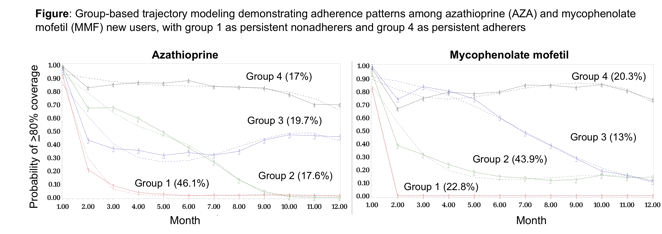Session Information
Session Type: ACR Poster Session B
Session Time: 9:00AM-11:00AM
Background/Purpose: Azathioprine (AZA) and mycophenolate mofetil (MMF) are commonly used immunosuppressants for moderate-to-severe SLE. Overall adherence among SLE patients has been shown to be poor but few studies examine adherence patterns over time by specific immunosuppressant. We applied an innovative method, group-based trajectory modeling (GBTM), to investigate longitudinal, dynamic patterns and predictors of adherence among new users of AZA and MMF in a U.S. nationwide cohort of Medicaid enrollees with SLE.
Methods: We identified prevalent SLE patients in the Medicaid Analytic eXtract, which includes demographics, claims and pharmacy data for enrollees from most U.S. states (2000-2010). We determined new use of AZA or MMF based on ≥6 months of enrollment with no prior use, and required ≥1 year of follow-up after first dispensing (index date). Predictors were determined during the 6 months pre-index date. We assessed overall adherence using the proportion of days covered (PDC ≥80%=adherent) and used logistic regression adjusting for age, sex and race/ethnicity to compare adherence to MMF vs. AZA. We applied GBTM to examine monthly nonadherence patterns (≥80% days covered/month=adherent), beginning at the index date. Multivariable multinomial logistic regression models adjusted for sociodemographics, comorbidities, medication and healthcare use, preventive care, state and year, were used to determine predictors of adherence trajectory patterns.
Results: There were 2360 new users of AZA and 2135 of MMF. Mean age of AZA users was 36 (±12), 92% were female, 47% black, 25% white and 20% Hispanic; mean age of MMF users was 34 (±12), 90% were female, 45% black, 24% white and 21% Hispanic. 14.9% of AZA users were adherent (PDC ≥80%) vs. 17.7% of MMF users (p=0.01); the odds of adherence (PDC ≥80%) were 1.25 times higher (95% CI 1.06-1.47) for MMF vs. AZA. For both AZA and MMF, 4-group trajectory models had the lowest BIC and posterior probabilities >80% indicating the best fit (Figure). 46% of AZA users and 23% of MMF users were persistent nonadherers (group 1); 17% of AZA users and 20% of MMF users were persistent adherers (group 4). Multivariable multinomial regression models (persistent nonadherers (group 4)=ref) demonstrated that females vs. males, younger vs. older ages and black race and Hispanic ethnicity vs. white had significantly increased odds of nonadherence to AZA, but not to MMF. More emergency department visits and ever corticosteroid use increased the odds of nonadherence to MMF, but not to AZA.
Conclusion: In this cohort, persistent adherence to either AZA or MMF in the first year of use was rare. We observed even poorer overall adherence among AZA users compared to MMF with distinct nonadherence patterns for each drug and different associated demographic and utilization predictors. Further studies are needed to determine whether drug-related characteristics contribute and whether adherence should factor into prescribing choice. 
To cite this abstract in AMA style:
Feldman CH, Collins JE, Zhang Z, Kawachi I, Solomon DH, Costenbader KH. Azathioprine and Mycophenolate Mofetil Adherence in a Nationwide Medicaid Cohort with Systemic Lupus Erythematosus [abstract]. Arthritis Rheumatol. 2016; 68 (suppl 10). https://acrabstracts.org/abstract/azathioprine-and-mycophenolate-mofetil-adherence-in-a-nationwide-medicaid-cohort-with-systemic-lupus-erythematosus/. Accessed .« Back to 2016 ACR/ARHP Annual Meeting
ACR Meeting Abstracts - https://acrabstracts.org/abstract/azathioprine-and-mycophenolate-mofetil-adherence-in-a-nationwide-medicaid-cohort-with-systemic-lupus-erythematosus/
